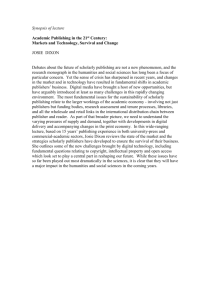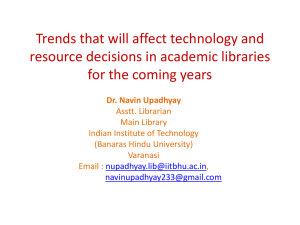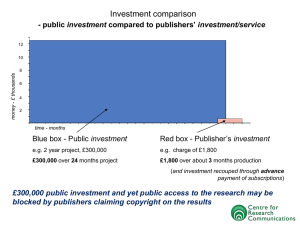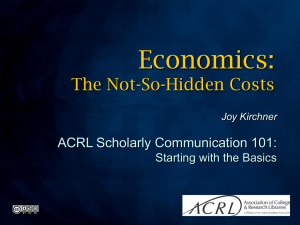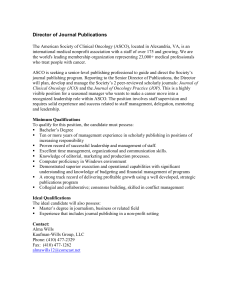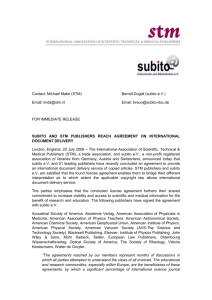Programme
advertisement
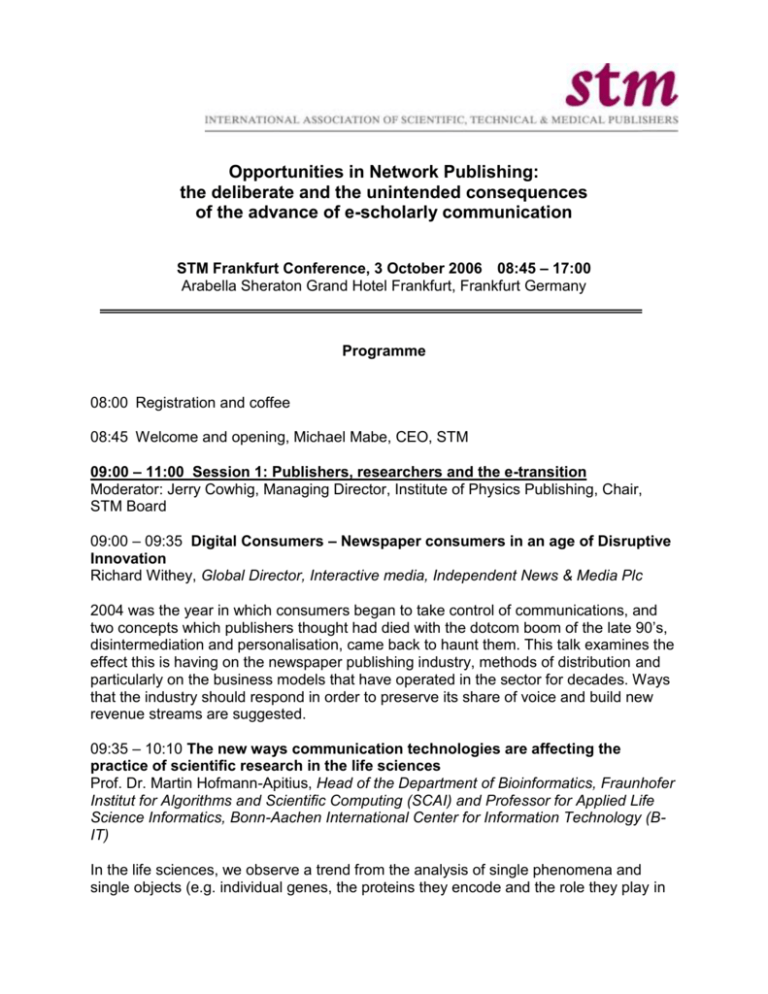
Opportunities in Network Publishing: the deliberate and the unintended consequences of the advance of e-scholarly communication STM Frankfurt Conference, 3 October 2006 08:45 – 17:00 Arabella Sheraton Grand Hotel Frankfurt, Frankfurt Germany Programme 08:00 Registration and coffee 08:45 Welcome and opening, Michael Mabe, CEO, STM 09:00 – 11:00 Session 1: Publishers, researchers and the e-transition Moderator: Jerry Cowhig, Managing Director, Institute of Physics Publishing, Chair, STM Board 09:00 – 09:35 Digital Consumers – Newspaper consumers in an age of Disruptive Innovation Richard Withey, Global Director, Interactive media, Independent News & Media Plc 2004 was the year in which consumers began to take control of communications, and two concepts which publishers thought had died with the dotcom boom of the late 90’s, disintermediation and personalisation, came back to haunt them. This talk examines the effect this is having on the newspaper publishing industry, methods of distribution and particularly on the business models that have operated in the sector for decades. Ways that the industry should respond in order to preserve its share of voice and build new revenue streams are suggested. 09:35 – 10:10 The new ways communication technologies are affecting the practice of scientific research in the life sciences Prof. Dr. Martin Hofmann-Apitius, Head of the Department of Bioinformatics, Fraunhofer Institut for Algorithms and Scientific Computing (SCAI) and Professor for Applied Life Science Informatics, Bonn-Aachen International Center for Information Technology (BIT) In the life sciences, we observe a trend from the analysis of single phenomena and single objects (e.g. individual genes, the proteins they encode and the role they play in a cell) towards system-oriented approaches aiming at the quantitative modelling of complex biological processes. This rather holistic approach towards biology, biochemistry and medicine requires assembling all relevant information for hundreds and thousands of genes and proteins. New technologies for the analysis of digitalized publications make it now possible to provide life science researchers with automatically extracted, condensed information on e.g. all human genes mentioned in publications, all their physical interactions in defined cell types and their role in normal cellular processes as well as in pathology. These information extraction technologies (“text mining”) will therefore have a significant impact on how life science researchers will use scientific publications in the future and have the potential to change completely how researchers navigate through knowledge and how they retrieve relevant information. 10:10 – 10:30 A Beta Site for Experimentation and Community Kent Anderson, Executive Director, International Business and Product Development, The New England Journal of Medicine Experimentation online is now normal. However, creating a defined experimental site is something few publishers have undertaken, despite the benefits. This presentation will cover the thinking leading to beta.nejm.org, the beta-testing site for the New England Journal of Medicine, its features, and results to date. The potential to involve the audience in the process of refining ideas, and the benefits to a brand, will also be covered. 10:30 – 10:50 Taking advantage of the Web 2.0 – What’s a small society publisher to do? Bill Silberg, Vice President, Publishing and Communications, New York Academy of Sciences Many STM publishers are struggling with how to move beyond first-generation web publishing and take maximum advantage of new online technologies that can facilitate communication with and among their core audiences. The issue is of particular concern to smaller society publishers, who might not be able to invest heavily in new web-based products or services but have ready-made communities that could greatly benefit from these new tools and serve as the basis for innovative publishing initiatives. This session will explore how a small but fast-growing multidisciplinary scientific academy is using the web to leverage its core strengths in convening communities of interest and looking for new business opportunities in the bargain. Panel Discussion 11:00 – 11:20 Coffee Break 11:20 – 12:30 Session 2: Libraries and Government and the e-transition Moderator: Dr. h.c. Albrecht Hauff, CEO and President, Georg Thieme Verlag 11:20 – 11:55 The future role of libraries and librarians as the e-transition continues T. Scott Plutchak, Director, Lister Hill Library of the Health Sciences, University of Alabama at Birmingham In the digital world, librarians’ focus shifts from building collections to facilitating access to information. New economic models, the development of institutional repositories, and the still uncertain impact of new forms of digital communication are having a dramatic impact across the entire scholarly communication continuum. Taking full advantage of the opportunities presented during the e-transition will require new partnerships among librarians, publishers, authors and readers. 11:55 – 12:30 The European Digital Libraries Initiative in the field of scientific and scholarly information Javier Hernández-Ros, Head of the Information Market, Unit in the European Commission, Directorate-General for the Information Society and Media The presentation will provide an overview of the objectives and results achieved so far by the European Digital Libraries Initiative launched in 2005. Subsequently it will cover the results of the recent online consultation on the recommendations of the study on the "Economic and Technical Evolution of the Scientific Publications Markets in Europe ". It will finally outline the objectives of the European Commission for maximizing the benefits of information technologies for making scientific information more accessible and easier to use in an online environment. 12:30 – 14:00 Lunch break 14:00 – 16:00 Session 3: Evidence and the e-transition Moderator: Brian Crawford, Senior Vice President, Journals Publishing Group, Publications Division, American Chemical Society 14:00 – 14:35 Researcher Behaviour at Early Internet Maturity Adrian Mulligan, Associate Director, Academic Relations, Elsevier, Oxford, England Has the advent of the internet had an effect on the fundamentals of scholarly communication? Elsevier, in partnership with NOP and the CIBER group, examined the motivations, influences, and attitudes of over 6,000 researchers. To give greater context to the research the usage behaviour of a portion of these 6,000 researchers was also examined. The findings, which are globally based, produced some surprising results. In an environment where peer review is seemingly under constant attack we assess the researchers’ commitment to it. 14:35 – 15:10 Consequences of E-journals and New Media on Reading Patterns Donald W. King, Visiting Scholar, School of Information and Library Science, University of North Carolina at Chapel Hill This paper presents evidence of how technologies and economic factors have influenced STM reading patterns over the past 30 years. STM readers read more articles from a broader range of journals, but at less time per reading because of a limitation or capacity of their time allocated to reading. Most additional reading comes from library collections due to a reduced number of personal subscriptions, increased number of articles found through online searching, and access to expanded library ejournal collections. Thus, far, there is little evidence that wikis, blogs and social network software have had any appreciable impact on reading patterns, although over time they may begin to compete for the time of readers. 15:10 – 15:30 Evidence and the Publishers Research Consortium Jim Pringle, Vice President, Product Development for Academic & Government Markets, Thomson Scientific Publishers and societies are coming together in new ways to support global research into scholarly communication. These ‘evidence-based’ initiatives seek to promote a better understanding of the role of publishing, based on unbiased data and objective analysis. The Publishing Research consortium (PRC) has emerged as a focal point for this work. This presentation provides an overview of the PRC, related cross-publisher initiatives, and the results of their work to date. 15:30 – 15:50 Assessing the Evidence: a report on the RIN/DTI/RCUK report on scholarly journal publishing David Worlock, Chief Research Fellow, Outsell, Inc., Chairman, Electronic Publishing Services, Ltd. The problem in the scholarly journals market is not lack of evidence, but too much conflicting evidence based on different geographies and samples at different times. RIN, the research network of the UK’s Research Council (RCUK) and the UK Department of Trade and Industry (RCUK), decided upon an evidence-based analysis of the data available, and this session is its first public report to the industry. For more detail, please go to: http://www.rin.ac.uk/?q=data-scholarly-journals Panel Discussion 16:00 – 16:30 Tea break 16:30 Current Issues for STM Moderator: Jerry Cowhig Mark Seeley, Vice President, General Counsel, Elsevier & Carlo Scollo Lavizzari, Carlo Scollo Lavizzari Attorneys, Michael Mabe 17:00 Close 17:05 – 18:05 Member Forum: Members only discussion on STM’s ongoing focus and priorities Moderator: Jerry Cowhig
